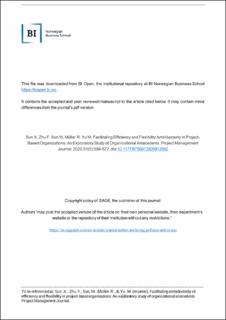Facilitating ambidexterity of efficiency and flexibility in project-based organizations: An exploratory study of organizational antecedents
Journal article, Peer reviewed
Accepted version
Permanent lenke
https://hdl.handle.net/11250/2754704Utgivelsesdato
2019Metadata
Vis full innførselSamlinger
- Scientific articles [2181]
Sammendrag
Through an exploratory multiple-case study in the context of project-based organizations in China, this study aims to identify the antecedents that facilitate three prevalent types of ambidexterity, namely, structural, sequential, and contextual ambidexterity. To understand and theorize on this phenomenon, seven case studies with 76 qualitative interviews were held. The results show that unpredictable and changing environments set the enabling context for ambidexterity, whereas design choices involving dimensions of structure, processes, empowerment, rewards, and human resource policies serve as structural antecedents. The managers and employees who respectively behave in supportive and initiative ways ultimately trigger different types of ambidexterity.
